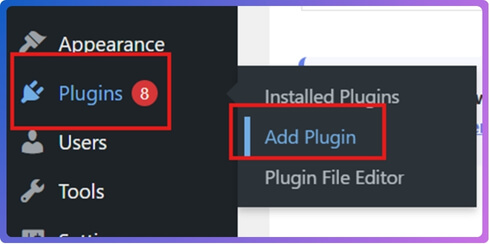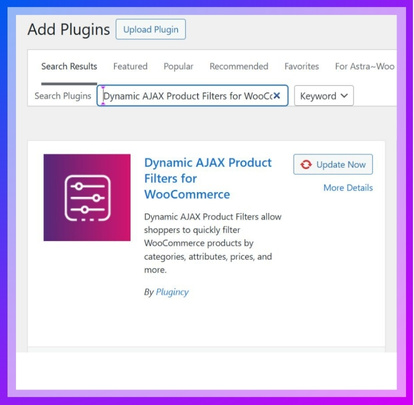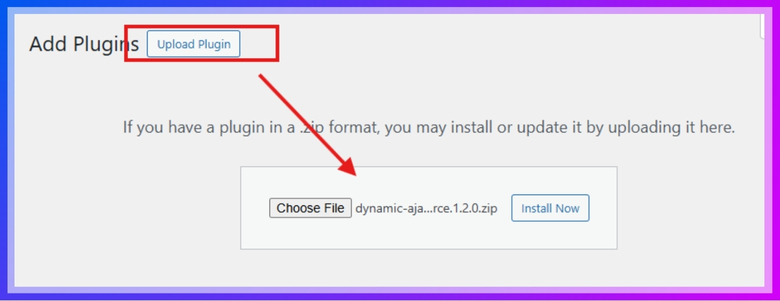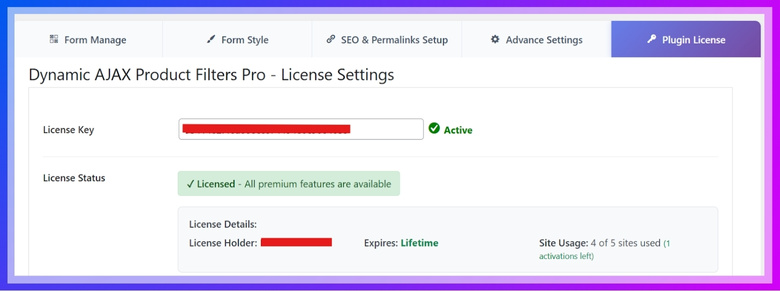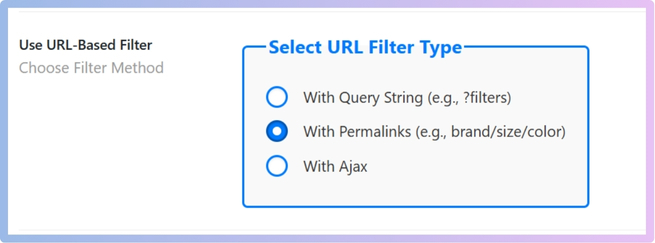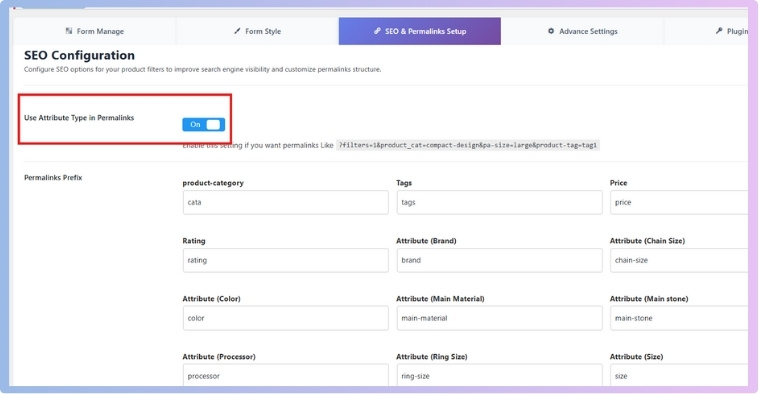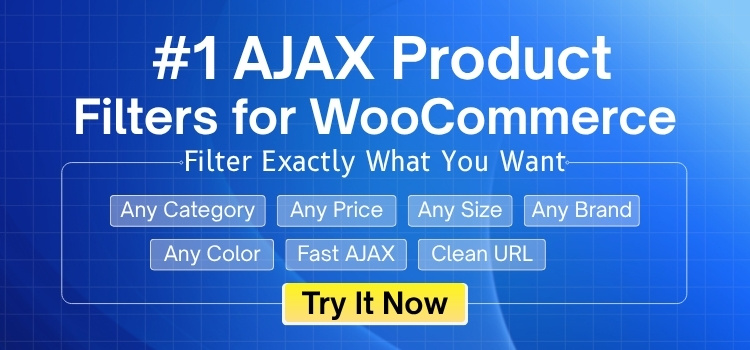Permalinks are the base of clean and structured links that make any online store look professional. They can change how customers see and use your shop pages. Many store owners often think about how to implement clean permalink-based filtering in WooCommerce.
Implement clean permalink-based filtering in WooCommerce using the Dynamic AJAX Product Filters plugin. Install the plugin, enable “With Permalinks” in the filter settings, and test it on your shop page. URLs will now show clean, readable paths like /brand/color/size, improving SEO and making filters user-friendly.
If you are curious about making your store easier to use and more search-friendly, then you are in the right place. Here you will find everything explained step by step. From setup to testing, all details are covered in this article.
How to Implement Clean Permalink-based Filtering in WooCommerce?
Having clear and simple links for filters can make your shop look professional and easier for customers to use. Instead of long, confusing URLs, you can set clean permalinks that show chosen filters right inside the link. Let’s go step by step on how this can be done.
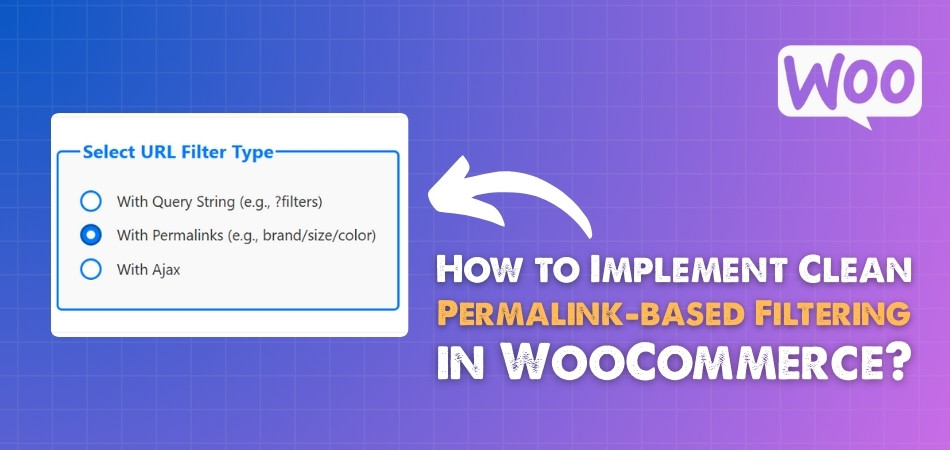
Step 1: Install the plugin
Implementing clean permalinks by custom rewrite rules is possible, but it takes advanced PHP and WordPress skills. The easier way is to use Dynamic AJAX Product Filters for WooCommerce. It comes with free and pro versions, and both support permalink-based filtering. You can install it directly from the dashboard or manually if you already have the ZIP file. Using a WooCommerce Ajax product filter plugin like this makes permalink filtering simple, user-friendly, and ready to use without deep coding knowledge.
Install From WordPress Dashboard
- Go to WordPress Admin Dashboard → Plugins.
- Click Add New Plugin.

- In the search bar, type Dynamic AJAX Product Filters for WooCommerce.
- Click Install Now.
- Click Activate.

Install Manually (Upload ZIP)
- Go to the Plugins option in your WordPress dashboard.
- Click Add New Plugin.
- Click Upload Plugin.
- Click Choose File and select the plugin ZIP.
- Click Install Now, then Activate.

Activate Pro License (Paid Only)
- Go to Product Filters → Plugin License.
- Paste your license key.
- Click Activate.

- Premium features will unlock.
Step 2: Enable Permalink-based Filtering
- In your WordPress dashboard, go to Product Filters → Form Manage.
- Scroll down to find the box called Select URL Filter Type.
- From the dropdown, choose “With Permalinks”.

- Click Save Changes.
- Now your URLs will look like this:
“https://example. com/brand/color/size”
Step 3: Use Attribute prefix in permalinks (optional)
- Go to Product Filters → SEO & Permalinks Setup.
- Find the option Use Attribute Type in Permalinks.
- Turn it ON.
- Save the changes.

- Now your URLs will include attribute prefixes. For example:
“https://example. com/shop/filters/cata=laptop/brand=asus”
Step 4: Test your Store
- Open your Shop page.
- Apply a filter such as color or brand.
- Check the URL — it should now follow the clean permalink structure you selected.
- Confirm that products load correctly when the filter is applied.
With these steps, you can set up clean permalink-based filtering in WooCommerce easily. Once installed and activated, the plugin lets you switch between normal clean permalinks and attribute-based ones, giving your shop a polished and professional look.
Benefits of Using Clean Permalink Filtering in WooCommerce
Clean permalink filtering can make your online store look better and feel easier to use. It is more than just a design change, as it also helps with search engines and customer comfort. Let’s explore the main advantages below.
Better SEO
Search engines value clear and simple URLs. When your store uses clean permalinks, it creates links that are keyword-rich and easy for search engines to read. One of the biggest benefits is the relationship between product filters and SEO, since clean permalinks create URLs that are both user-friendly and search-friendly.
Easier Sharing
Simple links are always easier to share. Customers can copy a product page link with selected filters and send it to friends or save it for later. Instead of messy strings of symbols, clean permalinks create short links that look professional and neat.
Improved User Experience
Clean permalinks give visitors a smoother shopping experience. Customers can instantly understand what filters are active by glancing at the URL. This makes browsing less confusing and more enjoyable. It helps people feel in control of their choices while shopping.
Professional Appearance
Neat links also add to the overall professional image of your store. A website with clean permalinks looks more trustworthy and well-organized. Customers often judge a store’s reliability based on small details like this, which can boost their confidence while buying.
Easy Tracking
Clean permalinks also make it easier to track specific product selections. You can quickly identify which filters were applied by looking at the link. This helps when analyzing customer behavior and makes product management simpler for store owners.
Using clean permalink filtering in WooCommerce not only improves SEO but also makes links easier to share, enhances user comfort, and adds a professional touch. These small improvements together can make a big difference for your store.
SEO Advantages of Clean Permalink-based Filters
Clean and simple URLs are a strong part of good online stores. They not only help customers understand pages but also make things easier for search engines. With the right setup, filters can boost visibility online. Let’s see how this works.
Better Crawling
When URLs are short and clean, search engines can crawl them faster. Complicated links with symbols or numbers make crawling harder. Clear permalink-based filters allow every product variation or category page to be understood easily. This helps search engines access and process your site more efficiently.
Higher Rankings
Search engines reward websites that are easy to read and structured well. Clean URLs send clear signals about page topics. For example, a URL with “/shoes/men/black/” is far more meaningful than “?id=123.” These organized links increase the chances of a better ranking in search results.
More Visibility
Filter pages with clean permalinks can also appear in search results. This means category and filtered product pages can attract extra visitors. SEO-friendly URLs help search engines crawl different product variations, even when customers are using color swatches as filters to refine their search.
Less Duplicate Content
Messy filter URLs often create duplicate pages with the same content. This confuses search engines and weakens rankings. Clean permalinks keep the structure tidy and reduce duplicates. With fewer unnecessary versions, the actual important pages get more attention from search engines.
User Friendly
Simple and descriptive URLs are not just good for SEO but also for customers. When people see “/shirts/blue/large/,” they know what to expect before clicking. This improves trust and usability, which search engines also notice when ranking pages.
Clean permalink-based filters improve crawling, indexing, and visibility for online stores. They keep your site structured, reduce problems with duplicate content, and make links user-friendly. With the right approach, filters can support both SEO strength and customer experience.
What Problems Can Occur With Clean Permalink Filtering?
Clean permalink filtering can make your store look neat and user-friendly, but it is not always perfect. Some technical issues may appear when using it, and these can affect both the store’s performance and customer experience. Let’s look deeper into this.
- 404 Errors: These errors often appear if rewrite rules are not set correctly, leaving users unable to access certain product or filter pages.
- Duplicate URLs: Search engines may find multiple links leading to the same content, which can harm SEO rankings and confuse indexing results.
- Plugin Conflicts: Conflicts may happen when other plugins try to control permalinks, filters, or product queries, causing unexpected issues across the store.
- Theme Compatibility: Some themes may not fully support permalink filtering, leading to layout issues, broken product displays, or misaligned filter sections.
- Slow Performance: When too many filters and clean URLs are generated, loading time may increase, causing frustration for visitors and potentially lost sales.
- Broken Filters: Sometimes filters stop working because of caching or query issues, and this can result in showing wrong or incomplete product results.
- Redirect Loops: Incorrect permalink structures may create endless redirects, preventing users from ever reaching the actual page they intended to visit.
- Hard Debugging: Troubleshooting errors linked with permalinks can be time-consuming, as problems may come from multiple sources, including themes, plugins, or caching.
- SEO Risks: If not handled carefully, clean permalinks may still generate duplicate paths or messy query strings, lowering search rankings over time.
- Cache Problems: Aggressive caching systems may fail to refresh clean permalink pages properly, showing outdated or incorrect product data to shoppers.
While clean permalink filtering offers a polished look, it is not without risks. Issues like conflicts, broken filters, or SEO problems can happen. Careful setup and regular testing are important to keep everything running smoothly and reliably.
How Can You Test and Verify Clean Permalink Filtering in WooCommerce?
Testing clean permalink filtering is important for both store owners and search engines. It helps confirm that product pages are easy to read, properly indexed, and working as expected. With the right checks, you can avoid hidden problems. Let’s explore further.
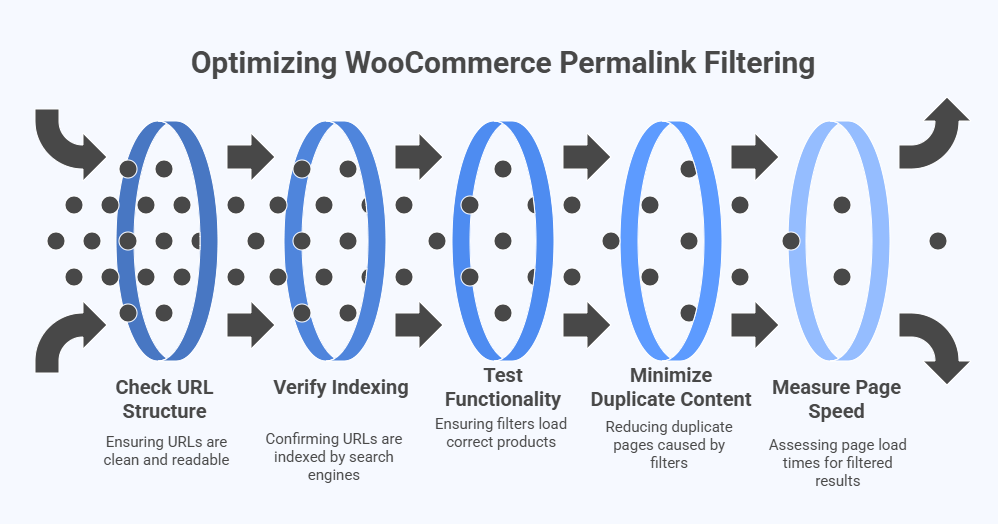
URL Structure
Start by checking how your filter URLs look in the browser. Clean URLs should be short, simple, and easy to read without random numbers. For example, “/shoes/men/black/” is clear compared to messy query strings. This makes the structure more user-friendly and SEO-friendly.
Indexing Check
Use Google Search Console or a site search command to see if filtered URLs are indexed. Pages that are important should appear in search results. If they do not, review your settings. Clean permalinks usually increase the chance of proper indexing by search engines.
Functionality Test
Make sure filtered URLs actually load the correct products when applied. Test different combinations like category, color, or price range. Every filter should work smoothly without errors. Functional checks confirm that the filtering system is reliable for both users and search engines.
Duplicate Content
Look for duplicate versions of the same page caused by filters. Too many duplicates can confuse search engines and lower the ranking. Clean permalinks should help minimize this issue. Testing ensures your filters do not create unnecessary or repeated versions of product pages.
Page Speed
Measure page speed for filtered results because performance affects both SEO and usability. Tools like PageSpeed Insights can highlight delays. Clean URLs usually perform better as they avoid complex query strings. Faster filtered pages keep users engaged and improve search visibility overall.
Clean permalink filtering works best when tested carefully for structure, indexing, function, duplicates, and speed. Each check ensures your filters help, not harm, your store’s performance. When optimized, they support stronger SEO and a better shopping experience.
FAQs About How to Implement Clean Permalink-based Filtering in WooCommerce?
Clean permalink-based filtering makes WooCommerce stores look professional and SEO-friendly. It also improves usability for customers by showing active filters inside the URL. Many store owners ask about setup, adjustments, and maintenance. Below are some important FAQs with answers.
Can I Use It Without Plugins?
Yes, you can create clean permalink filtering without plugins, but it requires coding knowledge. You would need to write custom rewrite rules in PHP and adjust JavaScript functions. This is advanced and not recommended for beginners. Using a plugin is usually the easier path.
Does It Work With Multilingual Stores?
Yes, clean permalinks can work with multilingual stores if the translation plugin supports it. You must make sure permalinks are consistent across all languages. Some translation tools have built-in compatibility with filter plugins. Always test both language versions after setup.
Can I Change the URL Format?
Most plugins allow you to edit the structure of filter URLs. You can choose whether to add attribute names or keep them short. This gives flexibility to match your SEO goals. Just make sure changes remain simple and easy to read.
Will It Work on Custom Themes?
Yes, clean permalink filtering can work with custom themes, but compatibility may vary. Some themes may require extra adjustments to avoid layout issues. Always test the filters after activation on your theme. If problems appear, you may need developer help.
Can I Control Which Filters Show?
Yes, you can choose which filters should appear in clean permalinks. For example, you may allow price and brand filters but not tags. This helps avoid creating too many extra URLs. Control settings are usually found in the plugin’s filter manager.
Does It Support Category-specific Filters?
Yes, clean permalink filters can be applied differently based on product categories. Clothing can show size and color, while electronics can show brand and features. This makes the filter experience more relevant. Category-specific control ensures customers only see useful options.
How Do I Keep URLs SEO-friendly?
To keep them SEO-friendly, avoid messy symbols and long query strings. Use short words that match product categories and attributes. Search engines prefer clear and organized URLs. Consistency in format helps both ranking and crawling efficiency for your store.
Can Customers Share Filtered Links?
Yes, clean permalink filtering allows customers to copy and share filtered product links. This is very helpful when sending product recommendations to friends. Shared links will open with the same active filters. It makes browsing and product discovery easier for everyone.
Is It Compatible With Caching Plugins?
Yes, most caching plugins support clean permalink filtering, but testing is important. Sometimes cached pages may not refresh properly with active filters. Adjusting caching rules usually solves this problem. Make sure to check functionality after enabling both together.
Can I Track Filter Usage in Analytics?
Yes, clean permalinks make it easy to track filter usage in analytics. The URL structure shows which filters are active. You can measure which filters customers use most often. This information helps you improve store design and marketing strategies.
Conclusion
Clean permalink filtering is more than just a feature; it is a way to make your store professional, user-friendly, and optimized for search engines. By keeping links simple and organized, you create a better shopping experience that customers will appreciate.
The easiest way for anyone wondering how to implement clean permalink-based filtering in WooCommerce is by using the Dynamic AJAX Product Filters plugin. It only takes installation, enabling permalink filtering, and testing to ensure everything works perfectly across your shop pages.
To keep everything running smoothly, always test your URLs, check page speed, and monitor for duplicate content. Small adjustments can prevent problems later. With careful setup, your store can enjoy a clean structure. Wishing you the best with your WooCommerce store.
